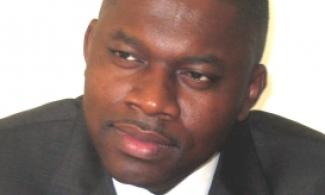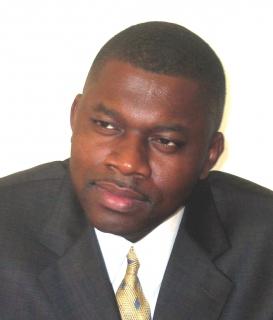
The trend among the African literati has been to make claims of lineage to one of the three preeminent writers of post-colonial African literature - Chinua Achebe, Wole Soyinka or Ngugi Wa Thiong’o. Chimamanda Ngozi Adichie famously narrated how she mentioned in passing that she grew up in a house that Chinua Achebe vacated at the University of Nigeria, Nsukka campus, and her American editor insisted in putting it in her biography.
The trend among the African literati has been to make claims of lineage to one of the three preeminent writers of post-colonial African literature - Chinua Achebe, Wole Soyinka or Ngugi Wa Thiong’o. Chimamanda Ngozi Adichie famously narrated how she mentioned in passing that she grew up in a house that Chinua Achebe vacated at the University of Nigeria, Nsukka campus, and her American editor insisted in putting it in her biography.
“…It’s the most important thing that you’ve told me about yourself!” her editor said.
At 2013 PEN America tribute to Chinua Achebe at The Town Hall in New York City, Chris Abani told stories of how he wooed girls in Secondary School with lines from Achebe’s Things Fall Apart.
Stories abound of African writers marketing tales to link them to one of the trio – Achebe, Soyinka, and Ngugi. The truth, however, is that the only contemporary African writer who can lay claim to a marginal relationship with Achebe, Soyinka, and Ngugi is Okey Ndibe. And that is how he starts his memoir, Never Look an American in the Eye.
From telling stories about his first meeting with Achebe and how it led to his coming to America, Ndibe goes deep into his childhood fantasies of communist life, American wrestling, and the English dream that many people born in former English colonies often have. For all his rebellious nature, Ndibe pays attention to the words of his elders even when he disagrees with them. They become helpful when he arrives in America and confronts the cold realities of his new abode. A curious and vibrant fellow, Ndibe approaches writing the same way an artist approaches the canvas. He is willing to use himself as a brush to draw a picture. It is at the core of the memoir as a genre. As he narrates, in the first few chapters of Never Look an American in the Eye, his adventures into writing, readers will have no doubt at the extent he is willing to go to find a story.
Ever since my teenage years, the insane had fascinated me. What was their history? When did they turn mad, and how? Was there some symmetry and logic in their thoughts and actions?
Growing up, I had known several madmen and women. I used to spend long hours trailing them, observing their idiosyncrasies, eavesdropping on their utterances. Sometimes, I would speak to them, try to coax them into a conversation. Page 119
The trajectory of a migrant’s life follows a well cut out template. There is the shock, the adjustment and then the transformation. Within this trajectory are the typical stories of alienation, loss, identity crisis and, hopefully, for the lucky few, redemption. What is often not clear, even for those who have lived it, is why some make it while others do not. In the hands of a master storyteller, these experiences are brought home in the most passionate way. With his signature humor and willingness to take the readers to places where most writers fear to go, Okey Ndibe brings to life stories that reinforce human resilience in the face of uncertainty. He writes with no bitterness but rather with the attitude of a man who has developed a quiet fortitude towards life’s curveballs.
Ndibe’s strength lies in his ability to milk a story, any story until he arrives at the core of its essence. What should have been mundane tale is transformed into a magnificent microcosm of themes universal to humanity. He tenders words as if they are delicate flowers. In dialogues of people he encountered in life, he captures and preserves conversations as if the future of stories, our stories, depends on them.
The title of the book came from an advice he received from an uncle as he prepared to leave for America in 1988 to edit Chinua Achebe’s new magazine, Africa Commentary. His uncle said to him, “Americans can’t stand any stranger looking them in the face. They take it as an insult. It’s something they don’t forgive. And every American carries a gun. If they catch you, a stranger, looking them in the face, they will shoot.”
As we see in the book, he spends a significant time unlearning some of the fallacies and misconceptions. In a pivotal case of mistaken identity when he was mistaken for an armed robber, Ndibe comes to term with the real America and how it really works, a far-fetch from the stories his uncle told. In one of the most fascinating tales in the book, Ndibe recounts the friendship between his father and an Englishman he fought alongside in Burma during the Second World War. Though his father didn’t meet the Englishman again, the two maintained a friendship via correspondence that lasted almost fifty years. Ndibe facilitated a phone call between the two men at one point capturing in the story how despite their differences, the two maintained a friendship till the end.
In 1994, Ndibe visits his father’s English friend in England. He makes this observation afterward:
“What moved me…was to see how two ordinary men had done extraordinary things; how they had salvaged something beautiful from the ravages of history; how, transcending their own narrow biographies, they enacted a friendship that could not be quenched neither by distance, time, war, nor for that matter, by death.”
There are times that you wish he would hold back only to be pulled along as he pours the stories all out. And then there are times that you wish that he would dig deeper, but he leaves you hanging on the teases. For a life that spans through some of Nigeria’s most turbulent years when the military adventure of Ibrahim Badamosi Babangida to Sani Abacha and of which Ndibe observed from the strategic media stool as a senior journalist in African Concord and African Guardian magazines, he shares his observations with great generosity without an iota of posturing. He bears witness without laying bare personal resentment. He indulges in the luxury of all great writers – the ability to unflappably look at events and dissect them.
A reader interested in understanding the development of the man and the psyche that informs his core, Never Look an American in the Eye provides the roadmap. This is very pronounced when he chronicles his journey from a young man afraid of commitment to a man who later embraces fidelity. Ndibe narrates the role his wife, Sheri, played in taming the rebel in him who was dedicated to opposing everything his father and mother stood for. Writing on this, he allows himself to be vulnerable.
“My dread of serious relationships was at once ironic and understandable. I’d suggest that its root was in my parents’ exemplary marriage, a relationship that inspired amazement and admiration in each town where we lived. My parents were models of fidelity and closeness at a time and in a society where public displays of affection were rare.” Page 203
So many memoirs of the American experience have been written. More will be written as long as people from other parts of the world continue to come to America. But this one by Okey Ndibe will stand as a gold standard in the genre. It is remarkable in so many regards, but its ability to inspire is perhaps its most potent force. In the end, the image of a modest man with great strength of character, wit, and talent will remain with you long after you have closed the last page.
………………………………………………………………………………………………………
Rudolf Ogoo Okonkwo’s most recent work is “This American Life Sef!”
